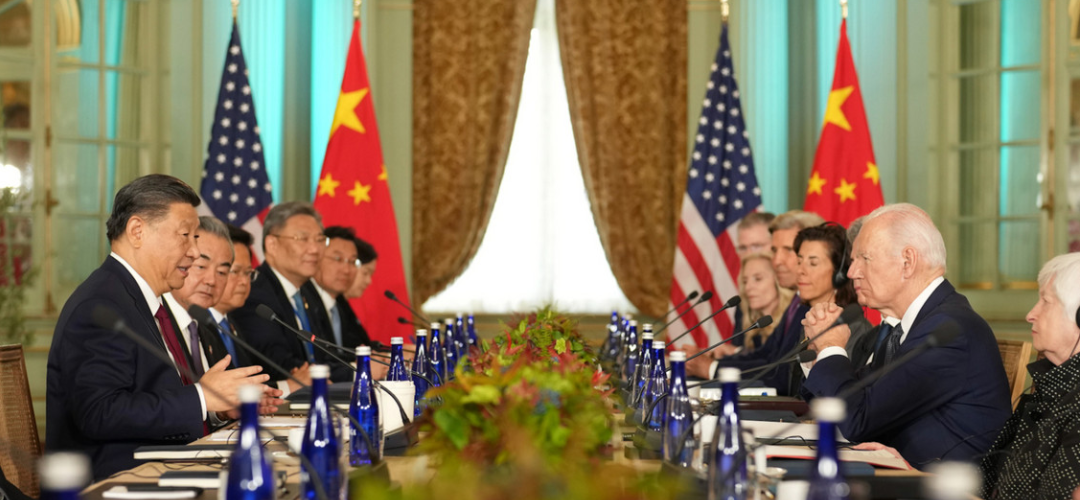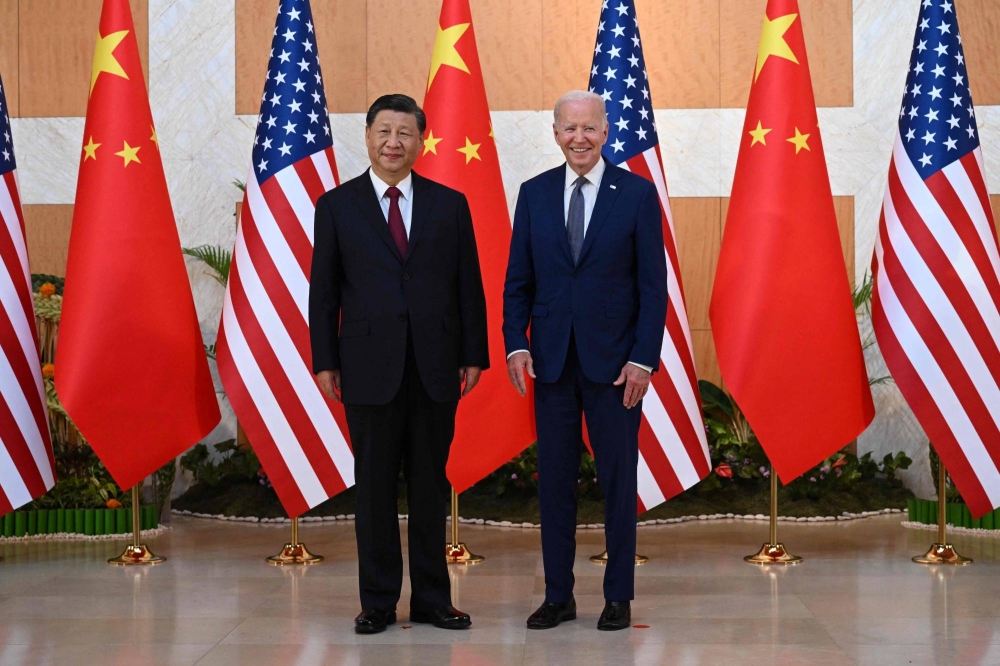A Pivotal Diplomatic Encounter?
November 25, 2023 | Expert Insights

The world witnessed a much-needed moment as U.S. President Joe Biden and Chinese President Xi Jinping engaged in a crucial summit in San Francisco.
The world heaved an almost audible sigh of relief as news swarmed over the global media that the Chinese and the U.S. Presidents would finally meet face to face. On November 15, 2023, on the sidelines of the Asia-Pacific Economic Cooperation (APEC) summit being held in the U.S. for the first time after 2011, the two leaders finally met.
The timing could not have been more opportune, with the Gaza fighting threatening to assume regional dimensions and the war in Ukraine continuing to drag on with dangerous overtones of escalation even further.
This face-to-face meeting marked the first between the two leaders since Biden assumed office in January 2021, providing a platform to address the intricate and strained relationship between the United States and China.
Background
A delicate dance of cooperation and competition has long characterised the dynamics between the United States and China. Economic interdependence has coexisted with ideological disparities, trade disputes, and geopolitical tensions. Recent years have seen an escalation of these tensions, fuelled by issues ranging from trade disputes and technological competition to human rights concerns.
Five years ago, during an extravagant gathering hosted by Donald Trump at Mar-a-Lago, Mr. Xi led a China brimming with the confidence of its rising prominence. The country's economy was flourishing, surpassing expectations, and its unemployment rate hovered at unprecedented lows. While skilfully securing a second term, Mr. Xi proudly championed China's "flourishing" growth model as an exemplary path for other nations to emulate.However, even amidst this aura of success, subtle cracks were beginning to mar what he confidently proclaimed as his "Chinese Dream." Unfortunately, these fissures have only grown wider in the years that followed.
Despite the underlying tensions, the Xi-Biden summit served as a crucial effort to foster dialogue and understanding between the two global superpowers. The four-hour discussion covered a spectrum of issues, including the sensitive Taiwan Strait, the South China Sea, climate change, and nuclear proliferation. While the summit did not yield breakthroughs, it provided a platform for leaders to air grievances, exchange perspectives, and explore potential areas of collaboration.

Analysis
The repercussions of the Xi-Biden summit extend far beyond the borders of the United States and China. The outcomes of this meeting will shape global dynamics, influencing not only the bilateral relationship but also the broader geopolitical landscape. The ability of the two leaders to find common ground and manage their differences will profoundly impact international stability and cooperation.
While the summit itself marked a positive step, the long-term trajectory of the relationship remains uncertain. The success or failure of these efforts will echo through the corridors of global power, affecting the future order.
The Xi-Biden summit, by its nature, was a diplomatic success in fostering constructive dialogue. The leaders acknowledged the importance of communication, emphasising the need for ongoing discussions even in times of disagreement. This immediate impact lays the groundwork for a more stable and predictable relationship, which is critical in times of global uncertainty. In fact, formal communication channels between the two countries' militaries were reopened.
Biden's reaffirmation of the ‘One-China’ policy during the summit demonstrated a commitment to a longstanding U.S. policy recognising the People's Republic of China as the sole legitimate government of China. This move aimed at easing tensions surrounding the sensitive issue of Taiwan.
On mutual trade, both leaders recognised the importance of addressing trade imbalances and promoting economic cooperation. The acknowledgement of mutual benefits from a stable global economy reflects a pragmatic approach to economic relations.
Additional broader global issues discussed at the Xi-Biden summit included climate change and nuclear non-proliferation. This signifies a willingness between the United States and China to collaborate on matters transcending their bilateral relationship, which is a significant development. Cooperation between the United States and China is imperative, as they are the leading contributors to global greenhouse gas emissions. The two leaders agreed to collaborate at the summit to reduce emissions and advance renewable energy. They also agreed to maintain their participation in the Paris Agreement, a global climate change mitigation agreement.
As nuclear-armed states, both the United States and China are obligated to prevent the proliferation of such weapons. The two leaders reaffirmed their commitment to the international treaty Nuclear Non-Proliferation Treaty (NPT), which seeks to prevent the proliferation of nuclear weapons, at the summit.
It is encouraging that the United States and China are willing to collaborate regarding nuclear non-proliferation and climate change. These issues are of such a critical nature that their resolution should not be entrusted to a single nation. The collaboration between the United States and China has the potential to significantly impact the resolution of these worldwide challenges.
Demonstrating dedication to collaborative endeavours in countering these common challenges signifies an intention to work together beyond the confines of bilateral interests. This implies that despite their disagreements on other issues, the United States and China are willing to collaborate on matters of mutual interest. This is a positive development.
Nevertheless, it is essential to observe that not every underlying tension between the United States and China was resolved at the Xi-Biden summit. Regarding Taiwan, human rights, and trade, the two nations continue to hold substantial divergences of opinion. These disagreements will likely complicate relations between the United States and China in the coming years. Discussions on Gaza or Ukraine, which must have figured, were not released to the media.
While the immediate impact of the summit is positive, the long-term implications will depend on the sustained efforts of both nations. The potential for reduced tensions, enhanced communication channels, and a willingness to engage on global challenges are promising signs. The focus on dialogue and cooperation at the summit could reduce tensions and prevent further escalation. This potential shift in tone is crucial for maintaining global stability. Establishing new communication channels, including high-level dialogues and working groups, offers a more effective communication and crisis management mechanism. These channels can serve as a bridge during times of disagreement.
Assessment
- The long-term trajectory of US-China relations remains uncertain. The potential for both cooperation and competition will define the future course of this critical bilateral relationship, with each side needing to navigate complex geopolitical waters.
- The Xi-Biden summit offers a glimpse into the evolving dynamics between the United States and China. The outcomes of this meeting will hopefully impact the worsening international landscape, preventing the escalation of tensions, especially in the Middle East and Eastern Europe.
- As the world grapples with the complexities of the 21st century, the US-China relationship will remain a central focus, demanding careful diplomacy, strategic foresight, and a commitment to finding common ground amidst profound differences. The Xi-Biden summit, while not a panacea, has set the stage for continued engagement and dialogue, providing a glimmer of hope in an otherwise complex geopolitical landscape.








Comments